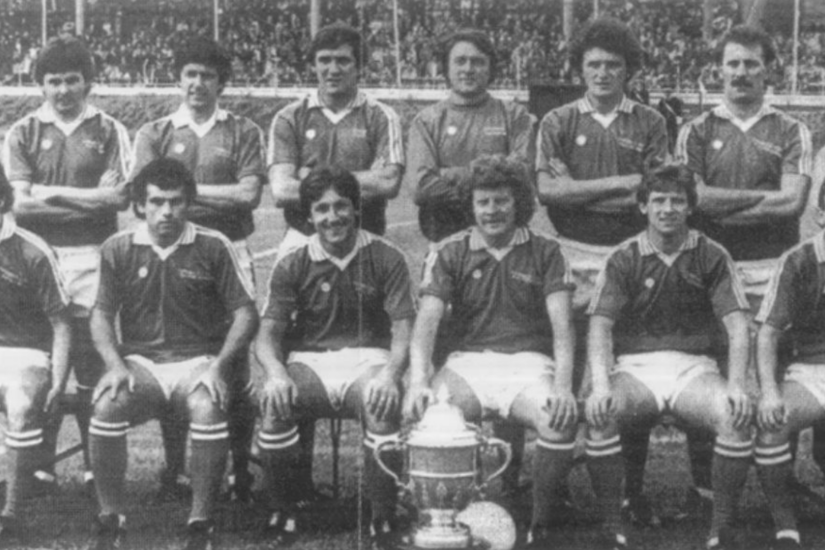From Lions to Limerick: The diverse sports journey of Tony Ward

Limerick United Cup Winners in 1982 Credit: None
Admittedly in the amateur era, Tony Ward played rugby at the highest level, while also able to fit in League of Ireland spells with Shamrock Rovers and later in an extraordinary sporting career, Limerick United.
However, had it not been for a mother’s determination that school exams take precedence over football trials in England, the Ireland fly-half debate, Ward or Ollie Campbell would never have materialised.
“When I was growing up, I played rugby because I went to St Mary’s, a rugby playing school, but the sport I loved the most at the time was football. The decisions I made over my sporting career was always in favour of rugby, even though I tried to balance both during the early eighties, which was very difficult.
"I was in the Ireland U-15s schoolboys side with Liam Brady. Liam went off to Arsenal for trials and I was doing my inter-cert, as it was called back then. I was invited to go to Arsenal as well, by a scout called Bill Darby, who had brought Liam over. Another scout, Billy Behan, wanted me to go to Manchester United on trial, too.
"My mother wouldn’t let me go over, as I was doing exams and I wasn’t impressed at all (laughs), I can assure you. I would have liked to have had an opportunity to give it a go, but look, it wasn’t meant to be.”
On the international rugby scene, Ward announced his arrival in style during the 1978 Five Nations Championship (Italy becoming the sixth participating country in 2000). At just 23, the Dubliner scored 38 points, a debutant record, while appearing immediately at ease at the highest level.
“In terms of personality, since I was a child, I was always a worrier. Yet when it came to football and rugby, the bigger the stage, for some reason, the easier it felt ... I just wallowed in it. Yet, I would worry before a game, worry after a game, but once I was out there, I was in heaven. Don’t ask me why.”
With the Rugby World Cup not in existence until 1987, the pinnacle for any international from Ireland or Great Britain was selection for a Lions test. Tony’s sole appearance arrived during the first game of the controversial tour of South Africa in 1980, scoring 18 points (a then record for any player against the Springboks) in a 26-22 loss.
“There was no talk whatsoever about apartheid amongst the players. Later on, I did take a strong moral stand and didn’t travel with Ireland the following year because of what I experienced on that tour. I remember arriving in Johannesburg airport and Syd Millar, the manager, met me.
"The first thing I saw when I came through to meet Syd at the gate was segregated toilets. That was the first time anything registered with me. It was a combination of innocence and ignorance, but what I experienced for the rest of the six to eight weeks certainly affected me for the rest of my days.
"I was happy with the later stand I took and it certainly didn’t endear me with the IRFU powers that be. There were two or three of us who didn’t travel with Ireland. I look back on my life with many, many regrets, but that’s the one decision I made that I definitely got right.”
In addition to some notable sporting career highlights, the dual player rightly deems being part of Limerick United’s 1982 FAI Cup winning side, a 1-0 final victory over Bohemians, as: “right up there.”
“We had a great manager in Eoin Hand, who went on to be Ireland manager and we’re still great friends to this day. Limerick had a great side in the early eighties. We won the league, the cup, we were three years in Europe.
"Despite being caught up in so much rugby, whenever I was available, Eoin included me in the Limerick set-up. They were very understanding when I came in, even though I was taking someone’s place. That said, I played in every game during that cup run in 1982.”
After hanging up his (football and then rugby) boots for good, Ward entered into journalism. Perhaps best known for articles in the Irish Independent and as a rugby commentator for RTE, it’s a career path that led him away from the pursuit of a coaching role at a high level.
“I started doing work for the BBC the year I retired. I then went to RTE and stayed there for around 30 years. I still do BBC Northern Ireland commentary with Jim Neilly and I still enjoy it ... The same goes for the Independent. You’re going from being the person on the inside, to the other side of the fence, so to speak.
"I found that difficult in the early days because nothing, but nothing compensates for playing and yet, when you’re covering a game or in commentary, probably more so in TV and radio, the adrenaline is still pumping on the day of the game. While it’s not the same as being out on the pitch, it’s still a link which keeps me involved in the sport.”

